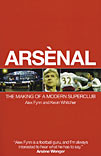 The Making of a Modern Superclub
The Making of a Modern Superclub
by Alex Fynn & Kevin Whitcher
Vision Sports, £16.99
Reviewed by Cameron Carter
From WSC 260 October 2008
At last – a football book that reflects the spirit of the age. Arsènal – The Making of a Modern Superclub is a forensic account of the boardroom rumblings that have produced a world brand that sells property in London, beer in India and credit cards in Hong Kong. And 90 minutes of football in England on a Saturday.
To put the content of the book in strictly statistical terms, in keeping with the general approach of its authors, Arsènal is approximately five per cent football, 30 per cent Arsène Wenger and 65 per cent boardroom politics. Its chief strength is in the depth of knowledge of Alex Fynn, a former director of Saatchi and Saatchi, and Kevin Whitcher, editor of the fanzine The Gooner, and the different angles from which they approach their topic.
This means that criticism of the club’s stadium sponsorship, for example, is given in both financial terms – they could have “protected the brand” and made a more lucrative deal – and emotional terms, namely that selling the name to Emirates is just one more way of managing the club as a business with scant regard for the fans or history. It means that the board’s astuteness in minimising interest repayments on the loan to build at Ashburton Grove can be praised, while the fact that 100,000 “Silver” and “Red” members pay £25 a year just for the possibility of a sniff of an unwanted ticket, or that the club tried to trademark the word “Gooner”, can be correctly identified as sound business chicanery.
Former vice-chairman David Dein emerges as the main character here – proud, headstrong and ultimately doomed. Dein brought Wenger to the club, he eased Arsenal into the G-14 group, and was finally sacked last year for the clandestine plotting of a takeover by US sporting franchise millionaire Stan Kroenke.
Wenger appears as an other-worldly passenger in this financial juggernaut, one who helpfully understood that the money has been tied up in the new stadium and happily muddled through on a net spend on transfers of only £4 million per year. While frequently referred to as a miracle-worker, Wenger does come in for some criticism for his apparent inability to raise his players in a period of crisis, his insistence on watching the game from the touchline – despite admitting he can’t see everything from there – and for his perceived lack of tactical innovation. Also noted is a significant distancing of the players from the fans during his tenure, with Wenger’s craze for avoiding distraction meaning, among other things, that there is no longer any chance of a glimpse of the players on match days outside the ground or indeed any unsupervised contact with them from outsiders (not to mention his blanket ban on pornography at the hotels where the team stay).
There is an uneasy balance throughout Arsènal between the upbeat descriptions of the club’s burgeoning wealth and expansion – they become the third richest club in the world when income from property development is taken into account – and the mildly plaintive tone struck when considering the impersonality of the new institution that has been created. Former managing director Keith Edelman’s explanation for the Emirates deal – “The money was an important revenue stream for us to be able to plug into our financial model” – is enough to bring out the arsonist in a chap, and the authors, while underlining the importance of the money men in the club’s progress, are embarrassed enough to remark that Edelman is not strictly employing the terminology of a fan. But then, judging by the contents of this sober work, if we want to keep up with the modern game, we’ll all be talking in such terms before long.